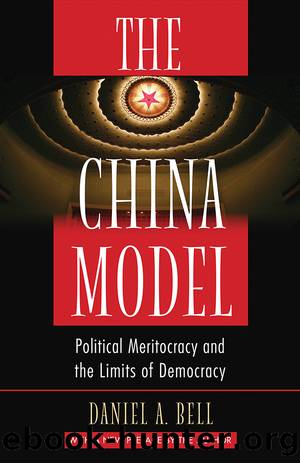The China Model by Bell Daniel A.;Bell Daniel A.;

Author:Bell, Daniel A.;Bell, Daniel A.; [Bell, Daniel A.;Bell, Daniel A.;]
Language: eng
Format: epub
ISBN: 9780691173047
Publisher: Princeton UP
Published: 2015-09-15T05:00:00+00:00
Jiang Qingâs Proposal for a Tricameral Legislature
Jiang Qing (b. 1952) is one of the most original and influential Confucian political theorists in mainland China. He is a normative thinker and his theory of legitimacy is a normative one: he defines legitimacy as morally justified rule; his main concern is not the social scientific question of what kind of rule happens to be regarded as morally justified in the eyes of the people. And his main target is the democratic theory of legitimacy as developed by liberal democratic theorists from Locke on, namely, that a state is legitimate if it has secured the consent of the people. Although democracyâa form of government that grants ultimate controlling power to democratically elected representativesâis built on the separation of powers, the separation, Jiang argues, is a matter of implementation rather than legitimization. In a democracy, legitimacy is based on the sovereignty of the people. But Jiang objects to the idea that there is only one source of legitimacy. He claims that the modern notion of sovereignty of the people is similar in form to the medieval notion of the sovereignty of God, but with the content changed from God to the people: âIn fact, the sovereignty of the people is simply the secular equivalent of the sovereignty of God.â29
In political practice, the overemphasis on popular sovereignty translates into the politics of desire: âin a democracy, political choices are always down to the desires and interests of the electorate.â This leads to two problems. First, the will of the people may not be moral: it could endorse racism, imperialism, or fascism. Second, when there is a clash between the short-term interests of the populace and their long-term interests or the common interests of all humankind, the former have political priority. Jiang specifically worries about the ecological crisis. It is difficult if not impossible for democratically elected governments to implement policies that curb energy usage in the interests of future generations and foreigners. If China were to follow the American model in terms of per capita carbon emissions, for example, the world would be damaged beyond repair. But âit is impossible for Green Parties to fullyâthrough legitimization and implementationârealize ecological values in a Western democracy, without radical change in both the theory and structure of Western democracy.â Hence, a political system must place more emphasis on what Jiang calls âsacred valuesâ that are concerned with the well-being of the environment, the welfare of future generations, and humanity as a whole.
Jiangâs political alternative is the Confucian âway of the humane authorityâ (wang dao). The question of political legitimacy, he argues, is central to Confucian constitutionalism. He defines legitimacy as âthe deciding factor in determining whether a ruler has the right to rule or not.â But unlike Western-style democracy, there is more than one source of legitimacy. According to the Gongyang commentary (a commentary on the Spring and Autumn Annals allegedly compiled by Confucius himself that chronicled the history of the state of Lu from 722 to 481
Download
This site does not store any files on its server. We only index and link to content provided by other sites. Please contact the content providers to delete copyright contents if any and email us, we'll remove relevant links or contents immediately.
The Secret History by Donna Tartt(19086)
The Social Justice Warrior Handbook by Lisa De Pasquale(12190)
Thirteen Reasons Why by Jay Asher(8909)
This Is How You Lose Her by Junot Diaz(6886)
Weapons of Math Destruction by Cathy O'Neil(6279)
Zero to One by Peter Thiel(5801)
Beartown by Fredrik Backman(5754)
The Myth of the Strong Leader by Archie Brown(5507)
The Fire Next Time by James Baldwin(5442)
How Democracies Die by Steven Levitsky & Daniel Ziblatt(5218)
Promise Me, Dad by Joe Biden(5153)
Stone's Rules by Roger Stone(5087)
A Higher Loyalty: Truth, Lies, and Leadership by James Comey(4962)
100 Deadly Skills by Clint Emerson(4925)
Rise and Kill First by Ronen Bergman(4788)
Secrecy World by Jake Bernstein(4753)
The David Icke Guide to the Global Conspiracy (and how to end it) by David Icke(4717)
The Farm by Tom Rob Smith(4507)
The Doomsday Machine by Daniel Ellsberg(4490)
